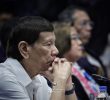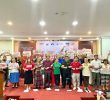REPUBLIC OF THE PHILIPPINES
Head of state and government: Gloria Macapagal Arroyo
Death penalty: abolitionist for all crimes
International Criminal Court: signed
A one-week State of Emergency was declared in response to alleged coup conspiracies. Rights of peaceful assembly were restricted and rebellion charges filed against prominent leftist politicians and others. Political killings of leftist activists continued as the government declared �all-out war� on communist rebels. A police task force and Commission of Inquiry established to investigate the killings resulted in only a limited number of arrests and prosecutions. Arbitrary arrests and enforced disappearances were reported in the context of counter-insurgency operations. Peace talks between the government and Muslim separatists in Mindanao continued. All death sentences were commuted and Congress passed a law abolishing capital punishment. Armed groups were reportedly responsible for abuses, including unlawful killings.
Alleged coup plots
In February, President Gloria Arroyo declared a weeklong State of Emergency in response to alleged coup conspiracies involving members of the mainstream opposition in �tactical alliance� with rightists, communist rebels, leftist politicians and members of the military. Police enforced a ban on public assemblies and raided a newspaper office, threatening to shut down media outlets that failed to follow �responsible� reporting guidelines. Scores of people were arrested or threatened with arrest, particularly members of legal leftist political parties which were accused by government and military officials of links with the Communist Party of the Philippines (CPP) and its armed wing, the New People�s Army (NPA). Dozens were arrested and charged with �rebellion� in the period following the alleged coup plot, including critics of the government.
In February, Crispin Beltran, Congress Representative for the Anakpawis (Toiling Masses) party, was detained on a warrant of arrest for rebellion. After the validity of the warrant and a subsequent charge of �incitement to sedition� were challenged by lawyers, he was further charged with rebellion. He had not been tried by the end of 2006.
Police sought to arrest five other leftist Congress Representatives on suspicion of rebellion. Afforded Congressional protective custody from arrest, they remained in the Congressional compound for over two months as prosecutors conducted preliminary investigations. The charges were dismissed by a court in May but further rebellion charges were filed against the five Representatives and over 45 other leftist suspects. All remained under threat of arrest at the end of 2006.
Political killings and counter-insurgency
A long-standing peace process between the government and the National Democratic Front (NDF), representing the CPP-NPA, appeared to be abandoned as the government declared a new offensive against communist rebels.
Armed attacks continued on members of legal leftist political parties, including Bayan Muna (People First) and Anakpawis. Reports of the number of such victims of alleged political killings ranged from 61 to at least 96 during the year. Most were killed by unidentified armed men on motorcycles. In some cases, those attacked had reportedly been under surveillance by people linked to the security forces or had received death threats.










